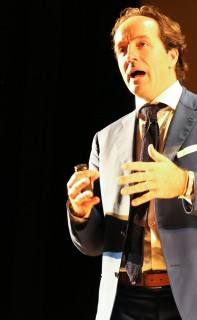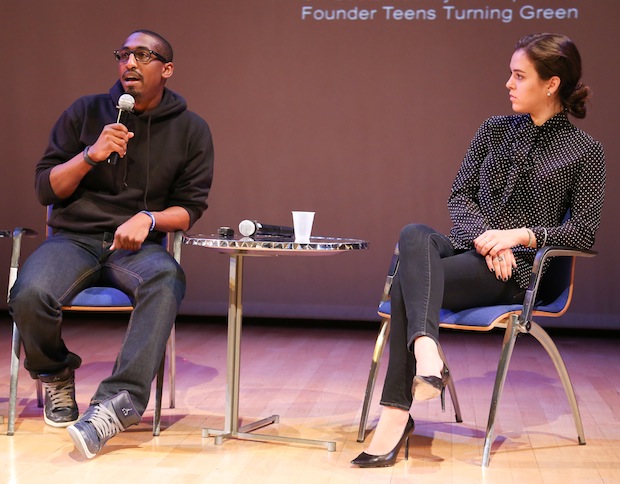On Monday November 11th, three remarkable entrepreneurs came to speak to Première and Terminale students about the impact they have had on the world. David Jones has an unparalleled record. He is the CEO of Havas Worldwide, a global company in advertising and communications, and the author of a book that details his idea of “social business,” the main theme of his presentation. Jones is also the founder of the One Young World, a non-profit organization that offers a global scale for young leaders from dozens of different countries to promote positive change.
Accompanying Jones on stage were two recent college graduates that he has worked with, Erin Schrode and Daniel Maree. Erin founded Teens Turning Green, a student-led non-profit organization promoting environmental sustainability. Daniel is the founder of the Million Hoodies Movement for Justice, which was originally created to rally support after the death of Trayvon Martin.
Doing business and doing good are equally important for companies
David Jones started off the conference by discussing the idea that his book is centered around: social business. Although these two words might seem contradictory, Jones showed how it seems that nowadays, doing business and doing good are two goals that companies should treat as equally important, something that was not done in the past. This is thanks to the digital revolution, which has empowered individuals and created what Jones called an age of damage.
Indeed, the development of social networks has made it much more difficult for multinational companies to get away with decisions that negatively affect the public, and many of them have learned this the hard way. Issues relating to the environment, human rights, and more are today inevitable noticed by people on social networks and protests can go viral within mere hours, ruining a company’s reputation in the process. This was the case for many companies like Goldman Sachs or British Petroleum. The social business idea allows companies to avoid such scandals and focus as much on doing good as making profit.
Daniel Maree and Erin Schrode.
After David Jones presented his idea, he invited Daniel and Erin onstage. These two young entrepreneurs have both worked with Jones and the companies they have founded fit right into the social business model. Beyond his initiative with the Million Hoodies Movement, which helped raise awareness for Trayvon Martin’s case, Daniel is also the founder of MPWRD (pronounced “empowered”), a company with the same goal as Million Hoodies, but broadened. Self-described as “cultural engineers for good,” MPWRD aims to help all minorities that still suffer injustices today.
Small steps, big changes
Erin, on the other hand, works primarily for a different cause: the environment. Although she has worked to help children in developing countries receive a better quality education through her creation of The Schoolbag, which aims to supply underprivileged children with school materials, her primary initiative was the creation of Teens Turning Green. She described the project as a way to trigger large-scale change by starting small. Indeed, she advocates making changes in everyday life by using products and practicing habits that are more environmentally and socially responsible. Anybody, she said, can help the environment simply by changing their own habits.
The message that came through was clear, and helpful for any future entrepreneurs in the room: today, although it is important to face real issues rather than attempting to build up a brand, making profit is also important or a business won’t be viable. The three speakers showed that not only are both possible, but both are also necessary. A brand will be nothing if it does not use its fame for good, and a start-up company trying to have an impact will have trouble doing so without renown. Bringing up the use of social media, something that most students in the room use daily, and how it can help in today’s digital age made the conference interesting. However, the fact that we could relate to the speakers who came made it especially engaging. David Jones, Daniel Maree and Erin Schrode gave all of the students in the room hope that we can truly have an impact.
About the Author :
Andrea is a Y12 student (Terminale ES) at the Lycée Francais de New York. It is her 5th year there. She is the news editor of the student publication The Lynx and passionate about history, economics, and tennis.



